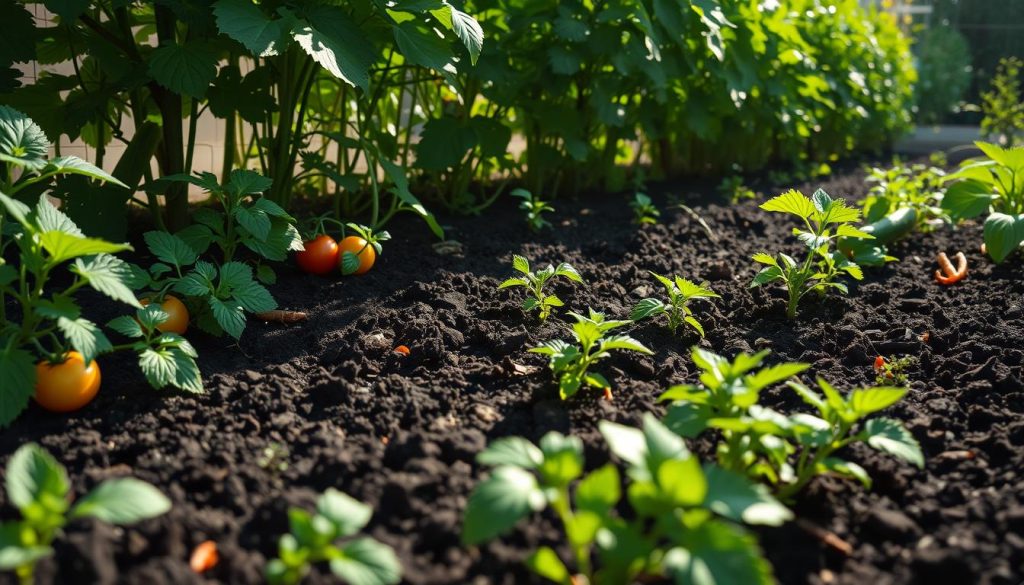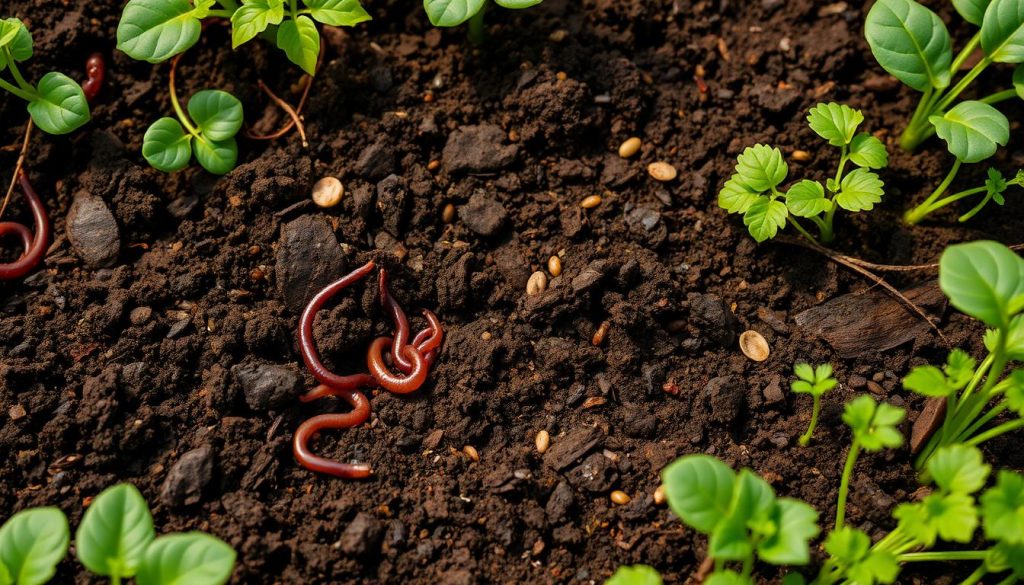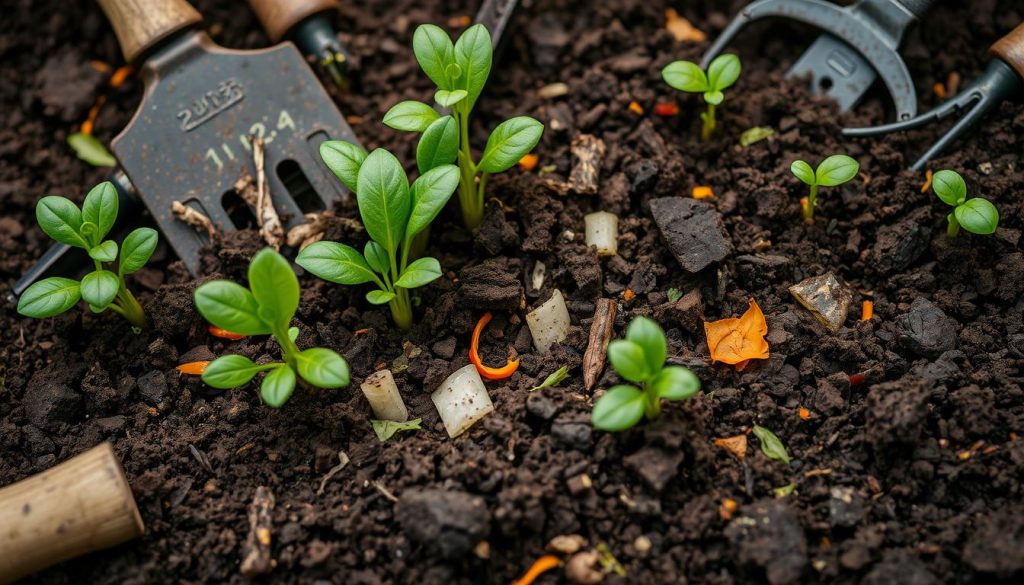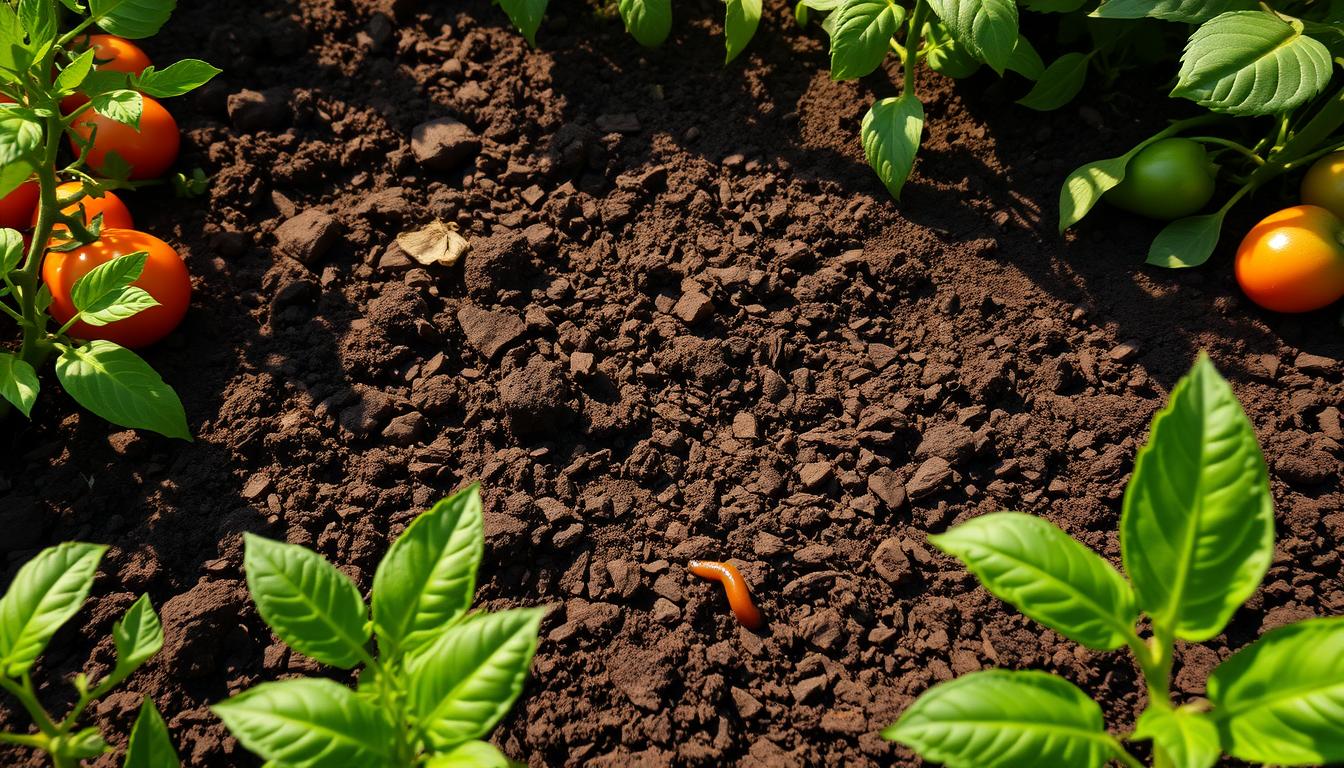As a gardener, I know how important the right soil is for a good harvest. I found that organic gardening soil is key for a thriving garden. A balanced soil mix is vital for plant growth, and I’m excited to share my findings with you.
With the right soil, you can enjoy fresh, delicious produce all season long. In this article, I’ll show you how to find the perfect soil for your garden. I’ll also give tips on creating a nutrient-rich organic gardening soil to improve your gardening.
Understanding the Importance of Soil Quality
As I started vegetable gardening, I learned soil quality is key. Good soil gives plants the nutrients, water, and support they need. It’s vital for a healthy harvest.
Soil for veggies should have the right mix of nutrients. This includes nitrogen, phosphorus, and potassium. These are crucial for plant health. Topsoil also matters, as it helps roots grow deep and strong.
Why Soil Quality Matters for Vegetables
Soil quality affects how well veggies grow, taste, and are nutritious. Poor soil can make veggies more prone to disease and pests. They also might not taste as good or be as nutritious.
The Role of Nutrients in Soil
Nutrients are essential for plant growth. A mix of nitrogen, phosphorus, and potassium is needed. I used compost and natural fertilizers to enrich my soil.

Soil pH and Its Impact on Growth
Soil pH is also important for plant growth. Most veggies do best in slightly acidic to neutral soil. If the pH is off, plants can struggle. I tested my soil pH often and adjusted it to help my veggies grow well.
Types of Soil for Vegetable Gardens
Creating a thriving vegetable garden starts with the right soil. I’ve learned that knowing the different soils and their traits is key. For raised beds, a balanced mix is vital for growth.
Loamy soil is often the top choice for gardens. It drains well, breathes, and holds water, great for many veggies. But, not all gardens have loamy soil. That’s where adding compost or manure helps. It improves soil structure and fertility, helping plants grow well.
Soil Options for Vegetable Gardens
- Loamy soil: balanced mix of clay, silt, and sand, ideal for vegetable gardens
- Sandy soil: drains well, but can be prone to drying out and nutrient deficiency
- Clay soil: can be heavy and prone to waterlogging, but can be amended with organic matter
Understanding soil types helps me grow a successful garden. Whether using raised bed soil or amending my soil, the right approach leads to great results. I know I can grow healthy, tasty veggies with the right techniques and materials.

How to Test Your Garden Soil
To find out how good your garden soil is, you need to test it. This step helps spot problems like not enough nutrients or the wrong pH levels. These issues can hurt your veggies’ growth. For the best results, use organic gardening soil. It’s full of nutrients and good bugs that help plants grow well.
Testing your soil can be simple at home with a DIY kit or by sending a sample to a lab. Here’s how to do it:
- Get a soil sample from your garden, focusing on the area where your plants’ roots are.
- Use a DIY kit to check your soil’s pH and nutrient levels.
- Send a sample to a lab for a detailed look at your soil’s structure and nutrients.
When you get the results, look at the pH level, nutrient content, and structure. This tells you if your soil is good for veggies and if it needs help. For example, if your soil lacks nutrients, add compost or manure to make it better. With the right soil and care, your garden will thrive, giving you lots of fresh veggies.

Remember, testing your soil is not a one-time thing. You should check it often to keep your garden healthy and productive. By picking the right organic soil and keeping up with testing and care, your garden will be a success. It will give you fresh, tasty food for many years.
Amendments to Enhance Soil Quality
To make your vegetable garden thrive, you need to improve the soil. A good vegetable garden soil mix is key for healthy plants. Adding organic matter, natural fertilizers, and adjusting pH levels can greatly enhance your soil’s fertility.
Adding compost or manure can improve soil structure and its ability to hold water. Natural fertilizers like fish emulsion or bone meal slowly release nutrients. Adjusting pH levels with lime or sulfur helps balance acidity, creating the best environment for plants.
Organic Matter: Compost and Manure
Compost and manure are packed with nutrients, boosting soil health. They help create a fertile soil mix that supports plant growth. Benefits include:
- Improved soil structure
- Increased water-holding capacity
- Enhanced nutrient availability

Natural Fertilizers: What Works Best
Natural fertilizers like fish emulsion or bone meal slowly release nutrients. They are better for the environment and prevent over-fertilization. Using these fertilizers helps your garden grow healthily without harming the planet.
Choosing the Right Soil Mix for Vegetables
Creating the perfect environment for my vegetable garden starts with the right soil mix. With many options, picking the best can be tough. I’ve learned to consider my vegetables’ needs and the local climate.
Using raised bed soil helps with drainage and aeration. I also make my own mix with topsoil, compost, and amendments. This way, I can match the soil to my vegetables’ needs.
Pre-Packaged Garden Soil Options
Pre-packaged garden soils are convenient but may not be the best. They often lack nutrients and structure for vegetables. Yet, some brands offer high-quality options that can be a good start.
Creating My Own Soil Blend
Making my own soil blend has transformed my garden. Mixing topsoil, compost, and amendments lets me tailor the soil. It also lets me control nutrients and structure.
Tips for Mixing Soil Types
Mixing soil types requires thinking about my vegetables’ needs and the climate. Here are some tips:
- Start with a base of high-quality topsoil
- Add compost or other organic matter to improve structure and fertility
- Consider adding amendments such as fertilizer or lime to adjust the pH
- Test the soil regularly to ensure it’s meeting my vegetables’ needs
Preparing Your Garden Bed
To make your vegetable garden grow well, you need to prepare the soil first. This means loosening the soil, getting rid of debris, and adding nutrients. I mix organic gardening soil with a vegetable garden soil mix for the best results.
Guidelines for Soil Preparation
Before you plant, loosen the soil to about 8-10 inches deep. This helps roots grow deeper. I also clear out rocks and weeds to start fresh.
When to Start Preparing the Soil
The right time to start depends on your area and the veggies you’re growing. Generally, start 2-3 weeks before planting. This lets the soil settle and the amendments work.
Best Practices for Layering Soil
I layer the soil for a good mix. I mix topsoil, compost, and other nutrients for a fertile soil. Here’s how to do it:
- Start with a 2-inch layer of compost or organic matter
- Add a 4-inch layer of topsoil
- Mix in any additional amendments, such as fertilizer or lime
- Finish with a 1-inch layer of mulch to retain moisture and suppress weeds
Water Management in Gardening
Proper water management is key for healthy garden soil. It affects soil quality and plant growth. Giving the right amount of water is crucial.
Overwatering or underwatering can harm your garden. It can cause soil erosion, nutrient loss, and stress to plants.
To manage water well, use soil amendments for vegetable gardening. Adding compost or manure improves soil structure and water retention. This reduces the need for constant watering and prevents waterlogged soil.
Soil Drainage and Aeration Tips
Improving soil drainage and aeration is vital. Here are some tips:
- Use a mix of sand, silt, and clay for well-draining soil
- Add compost or peat moss to improve soil structure
- Avoid compacting the soil to ensure proper drainage and aeration
Maintaining Moisture Levels
Keeping moisture levels right is key for plant growth. Mulch, compost, or other soil amendments help retain water and reduce evaporation. By following these tips and using the right soil amendment, you can have a thriving garden with healthy soil and plenty of crops.
Maintaining Soil Health Throughout the Season
To keep my vegetable garden thriving, I’ve learned the importance of maintaining soil health. This involves several key strategies. They help preserve the nutrient-rich soil for veggies and topsoil for growing vegetables.
Crop Rotation and Its Benefits
Crop rotation is a simple yet effective way to break disease and pest cycles. It improves soil fertility and increases crop yields. By rotating my vegetables, I ensure the soil remains balanced and nutrient-rich.
Mulching for Soil Protection
Mulching provides soil protection, retains moisture, and suppresses weeds. I use organic mulch like straw or wood chips. This keeps my soil healthy and protected.
Recognizing Soil Depletion Signs
Recognizing signs of soil depletion is crucial for taking corrective action. I regularly monitor my soil’s condition. This ensures it remains suitable for growing vegetables.
Some key signs of soil depletion include:
- Decreased crop yields
- Poor plant growth
- Changes in soil color or texture
By following these strategies, I can maintain the health and fertility of my soil. This ensures a bountiful harvest of nutrient-rich veggies.
| Soil Type | Nutrient Level | pH Level |
|---|---|---|
| Clay Soil | High | 6.0-7.0 |
| Sandy Soil | Low | 6.0-7.0 |
| Loamy Soil | Medium | 6.0-7.0 |
My Personal Soil Success Story
I’m excited to share my journey in finding the best soil for my garden. I tried many soil amendments and techniques. Now, I have a formula that brings me a big harvest every year.
What Worked for My Vegetable Garden
Using high-quality organic gardening soil was the key to my success. I mixed compost, aged manure, and sand. This created a soil that my vegetables love.
Surprising Lessons I Learned
I learned some unexpected lessons. Testing my soil’s pH regularly was crucial. I also found out that rotating crops keeps the soil healthy.
Tips for New Vegetable Gardeners
For new gardeners, start small and be patient. Make sure your soil is well-prepared. Don’t hesitate to ask for advice from local experts. With the right soil, you can have a thriving garden too.

